Görmeli | |
|---|---|
 View of Görmeli from the hills surrounding the village | |
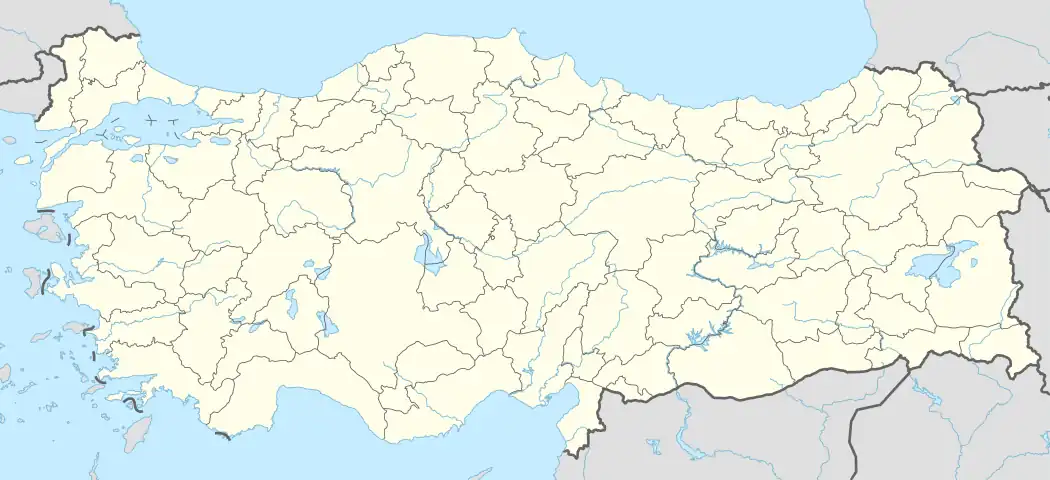 Görmeli Location in Turkey 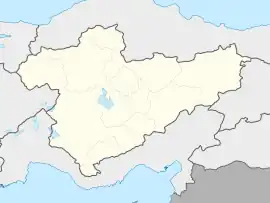 Görmeli Görmeli (Turkey Central Anatolia) | |
| Coordinates: 36°33′N 32°57′E / 36.550°N 32.950°E | |
| Country | Turkey |
| Province | Karaman |
| District | Ermenek |
| Area | 20 km2 (8 sq mi) |
| Elevation | 700 m (2,300 ft) |
| Population (2022) | 544 |
| • Density | 27/km2 (70/sq mi) |
| Time zone | TRT (UTC+3) |
| Area code | 0338 |
Görmeli is a village in Ermenek District, Karaman Province, Central Anatolia, Turkey.[1] Its population is 544 (2022).[2] It lies on the hillside of Taurus mountains.
Geography

Görmeli is located in the Karaman Region’s Taurus Mountains range, on the slopes of Taurus mountains. It is on the south-east side of Ermenek town, in the Karaman province. It is 18 km from the center of Ermenek and 90 km from the touristic towns of the mediterranean region Anamur. The village is on the main road of Ermenek and Gülnar. It is surrounded by forests and high mountains. The area is very productive, due to watery fields and soft soil. Almost all vegetables and fruits are grown locally. Görmeli presents quite a spectacular sight with its meadows, streams, plants, trees, animals, and the traditional lifestyle of its people.
History
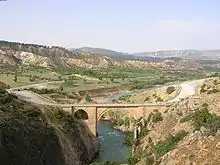
The time in which the area first became inhabited is still unknown. However, it is said that people were brought from Adana by the Emirate of Karamanid hundreds of years ago. Ala Köprü is also called Görmel. Köprüsü is a bridge 5 km (3 mi) away from the village. It was built by the Karamanid Emirate. Its length is 27m. and its width is 4.70 m. The future of this historical bridge is in jeopardy as it is going to be submerged by the Ermenek Dam, currently under construction. There is a historical building called Mennan Castle in the Nısa Neighbourhood near Görmeli. Mennan means "place to shelter in". The castle was built with rocks on a perpendicular mountain. It is also known as the castle that Karamanid from the Ottoman Gedik Ahmet Pasha, as a result of which Pir Ahmet Bey committed suicide within it. The castle is in ruins, dilapidated by treasure hunters. Some blame the authorities, whom, they say, did not attach enough importance to this historical building to protect it, with the result that the construction has been suffering from years of neglect.
Culture

Visitors can taste a traditional water-prepared meal called 'Batırma'. It consists of small wheat pieces, tomatoes, pepper, parsley, sesame, and walnuts. These ingredients are mixed and kneaded with cold water. The meal is served accompanied by fresh peppers, cucumbers, boiled cabbage, eggplants, tomatoes and boiled grape leaves. Another traditional local food is called 'Tarhana'. It is prepared with either minced meat and potatoes. The ingredient is mixed with wheat, tomato sauce, onion, pepper, and parsley. The mixture is kneaded and then shaped like a palm. The pieces are grilled on oak coal.
Economy
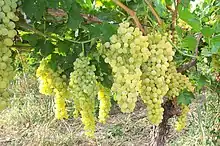
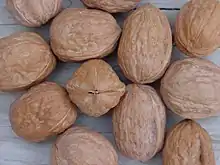
The hills and lower sides of Görmeli are not suited to farming. The inhabitants mostly support themselves by growing and selling fruits, vegetables, dairy products, or breeding livestock. "Görmeli's Grapes" are famous and there are grapevines in all fields, as well as apple, fig, walnut, and pomegranate trees. Every family has animals, several goats, a cow, and chickens. Sheep aren't suitable; they cannot adapt mountainous land. In addition the peasants don't eat mutton. Recent years, people grow vaccinated-special fruit saplings on the higher plateaus of the village. This economic activity also contributes budget of village box.
Neighbourhoods
Görmeli village is divided into six neighbourhoods:
- Boyalık
- Tekke
- Kışla
- Tuztaşı
- Köyyakası
- Nısa
Gallery
 Görmeli in winter
Görmeli in winter Harvesting chickpeas
Harvesting chickpeas View from the coffee house
View from the coffee house Boiling wheat
Boiling wheat General view from village
General view from village The peasants are winnowing grain
The peasants are winnowing grain Another view from coffee house
Another view from coffee house View from Koca Çayır
View from Koca Çayır View from the neighbourhood Tekke
View from the neighbourhood Tekke Sweet figs
Sweet figs Almonds of Görmeli
Almonds of Görmeli The old houses are made of stone in the village
The old houses are made of stone in the village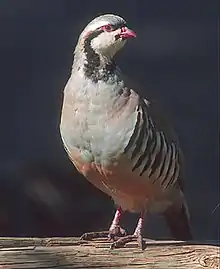 The partridges live on the mountains of Görmeli
The partridges live on the mountains of Görmeli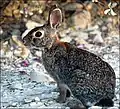 Wild Rabbit
Wild Rabbit Medlars from village
Medlars from village Wild Tulip in Görmeli
Wild Tulip in Görmeli Persimmons from village
Persimmons from village Göksü River near Görmeli
Göksü River near Görmeli
References
- ↑ Köy, Turkey Civil Administration Departments Inventory. Retrieved 1 March 2023.
- ↑ "Address-based population registration system (ADNKS) results dated 31 December 2022, Favorite Reports" (XLS). TÜİK. Retrieved 13 March 2023.